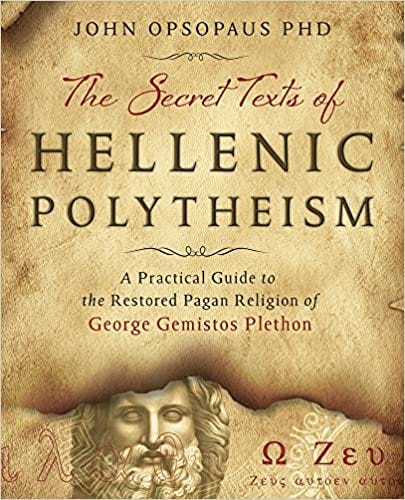Below is my critical review of “The Secret Texts of Hellenic Polytheism: A Practical Guide to the Restored Pagan Religion of George Gemistos Plethon" by John Opsopaus.
There are many critical things I have to say about this book after careful reflection, and I have listed them out.
Anachronism
My first significant critique of this book is how the author commits the historical crime of anachronism. As someone who has an M.A in History, an anachronism is problematic in historical writing.
Per MW dictionary, an anachronism is defined as:
1: an error in chronology especially: a chronological misplacing of persons, events, objects, or customs in regard to each other.
2: a person or a thing that is chronologically out of place especially: one from a former age that is incongruous in the present.
3: the state or condition of being chronologically out of place.
Throughout the first two chapters, where John explains the history surrounding Plethon and his writings, John improperly uses the modern usage of Pagan/Paganism instead of the historically accurate pagan/paganism. John constantly describes Plethon as a Pagan and Neopagan and ridiculously calls “Plethon” (since he adopted the name) his “Pagan name.” MAJOR FACEPALM.
John calls Plethon’s theology Pagan, Plethon’s students are called “Pagan students,” and his religion is “Neopagan Hellenism.” John suggests that Plethon was at heart a “Hellenic Pagan.” Other problematic terms found in the book are “Pagan Platonism,” and Hypatia (quickly mentioned) is called a “Pagan martyr” and “Pagan philosopher.”
Speaking as a historian, all of this is anachronistic. John is writing about the past and is projecting onto the past events and people the modern identity of Pagan and Paganism. A capitalized P-Pagan is a modern convention. Pagan today is a legitimate religious identity in which people claim to be Pagan and subscribe to a religion they call Paganism.
However, in the field of history, it is incorrect to use a capital P pagan when describing figures like Plethon or the ancient peoples that worshiped the Gods in general. Why is this? Because pagan, historically, was not a claimed religious identity, paganism was not a religion. Both terms stem from the Christians who used these terms to other those who were not Christian while trying to set the boundaries of their own Christian identity. My point is observable if you examine the book endorsement by Jay Bregman (history/religious studies professor) on the inside cover, you will see he properly uses a lowercase pagan in his endorsement.
Appropriation
The usage of capital P Pagan and Paganism in this book is not simply bad history on the part of John. It also enables and promotes cultural appropriation by confusing the reader into thinking that they and the book's subject (Plethon) share the same religious identity.
The anachronism misleads a Pagan reader of this book who consciously sees themselves as Pagan into thinking Plethon is Pagan also like them, and the religious system laid out by Plethon is Paganism like the reader’s Paganism. John opens the door wide for the appropriation of Plethon by an audience who thinks that what they are reading is just general religious material when, in fact, they are taking Plethon out of his historical context and political situation to sell this book to people Plethon never intended his work to be read by and used in ways he never intended for.
Plethon’s Context and His Appropriation
While it may be John’s noble mission to bring Plethon’s writing to an audience who may benefit from him, this book is blatant appropriation since Plethon’s religious system was tied together with his political agenda. The context of Plethon’s religion is stripped away by John, separated so that his religious system could be made consumable by an Anglophonic audience. Plethon was attempting in his day, like many polytheistic Greeks today, to reHellenize the region, restore worship to the Gods, and reform society and political institutions writ large. Plethon had a particular place and people he was directing his energy towards in his mind.
John dismisses Plethon’s context as a political reformer as “less relevant for Neopagan practice in our time” (page 2). This is the essence of cultural appropriation. For Plethon to be made marketable to an Anglophonic Pagan audience, Plethon has to be stripped of his context and a modern Pagan identity laid on top of him so he can be consumable. I am sure his proto-nationalistic ambitions would leave a sour taste in the mouths of many Pagans; I guess that is why John censors so much of Plethon.
Plethon, as scholars today observe, was foreshadowing the modern Greek state that was still a few centuries away from coming into being. Living at the end of the Byzantine empire, Plethon advocated for nothing short of a holistic religious and political revolution. Woodhouse, which John quotes as a secondary source for his book, says that there “is good reason for calling him both the last of the Hellenes…and the first of the Greeks” – Plethon straddled both our past and our future yet to come – and what has Plethon been reduced to by John Opsopaus? He is a “Neopagan” practicing “Neopagan Hellenism” with a bunch of “Pagan students” whose religion has been packaged exotically so that it could be appealing to an Anglophonic Pagan audience. Only Llewellyn could publish such trash; I am not surprised by how low they have sunk in their cultural appropriation of Greek culture to make a quick buck.
Lastly, a translation of Plethon would have been better presented through an academic press by a proper scholar in a field relevant to the topic.






h